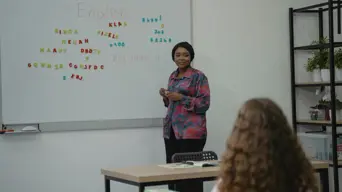Corporal punishment at schools still prevalent despite 28-year ban
The issue is going viral since an Eastern Cape teacher was suspended for allegedly punishing a learner physically.

English teacher / Pexels: Tima Miroshnichenko 5427868
Africa Melane speaks about the prevalence of corporal punishment in our schools with Stanley Malematja, attorney at the Centre for Child Law.
Despite corporal punishment being banned in South African schools since 1997, some teachers are still subjecting children to violence.
In 2019, Stats SA reported that out of 13 million scholars, one million between the ages five and 17, have reported abuse by teachers.
Of this, 84% were victims of corporal punishment, while the rest was verbal abuse, reports Malematja.
More recently, images of an Eastern Cape student with a swollen hand from the alleged assault by a teacher, surfaced on social media and is making headlines.
While the teacher has been suspended pending an investigation, he and the school are coming under fire for breaching the law.
However, this isn't the only school where corporal punishment is still prevalent, says Malematja.
"Corporal punishment is abolished at schools in South Africa. The Children's Act makes it clear that no educator is allowed to practice corporal punishment on a learner. It is prohibited and considered as abuse and a violation against children and children's rights."
- Stanley Malematja, attorney at the Centre for Child Law
Teachers found guilty of physical abuse will be removed from the educators role, but can still teach without any rehabilitative interventions. They'll be allowed back on the teacher's role provided they're not guilty of abuse for 10 years.
Guilty educators will also be fined one month's salary, payable over three months.
"This seems like a universal punishment for all educators. But the very same educator who is found guilty of corporal punishment, would be taken back to a classroom to teach the same children without any rehabilitative intervention."
- Stanley Malematja, attorney at the Centre for Child Law
Malematja argues that corporal punishment continues because abusive teachers don't undergo any rehabilitation.
"A function that is not rehabilitative does not help us deal with the root cause of the issue. That's why after more than two decades, we are still talking about issues of corporal punishment. There seems to be a lack of understanding for educators dealing with a naughty child, or a child who is not listening in class. This does not mean that the child forfeits their fundamental human rights. It does not mean that a child deserves corporal punishment."
- Stanley Malematja, attorney at the Centre for Child Law
Malematja also argues that violence won't help students with difficulties.
"There is a lack of understanding that violence can never sort out or bring about fruitful results."
- Stanley Malematja, attorney at the Centre for Child Law
Scroll up to the audio player to listen to the full conversation.